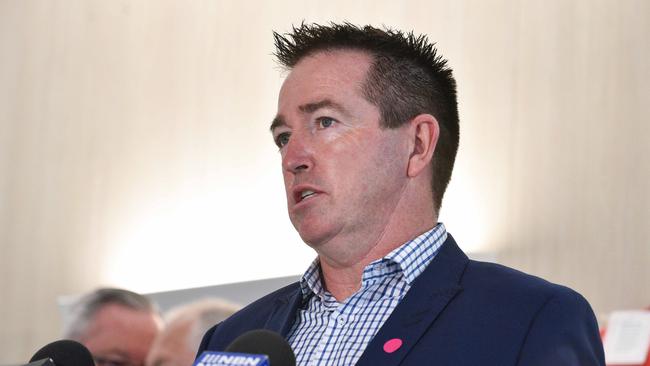Extreme climate protesters Blockade Australia pledge to shut down Sydney’s CBD
The climate protesters infamous for disrupting the Hunter’s rail lines are now threatening a week-long shutdown of the nation’s economic powerhouse.
NSW
Don't miss out on the headlines from NSW. Followed categories will be added to My News.
The extreme environmental protest group which blocked coal trains in the Hunter last year, causing delays to millions of dollars of shipments, has issued a chilling pledge to “do that tenfold” to Sydney’s CBD.
But NSW Police Minister Paul Toole has vowed not to let “selfish” protesters derail the state’s economic recovery, with police promising zero tolerance of illegal protests hellbent on bringing the city grinding to a halt.
Blockade Australia, the loosely-organised collective of environmental activists who shut down train lines across the Hunter in a series of rolling protests in November have now sworn to take the action “that can’t be ignored” in Sydney in June.

The group has sworn to “converge on Sydney from Monday June 27th to blockade the streets of Australia’s most important political and economic centre and cause disruption that cannot be ignored”.
“Sydney is centre of Australian political and economic power. The infrastructure that keeps this city functioning is as responsible for the climate crisis as the hunter valley coal supply chain (sic),” a post on the group’s Facebook page reads.
“Gridlocking the port of Newcastle dealt a massive blow to Australia’s ability to keep up its extractive operations. Blockading Sydney can do that tenfold.”
Deputy Premier and Police Minister Paul Toole said “reckless protests that disrupt the everyday lives of people is the last thing we need”.

“These protesters had complete disregard for people’s lives by putting the safety of freight workers and the community at risk. This is unacceptable and will not be tolerated,” he said.
“Plans to now shut down the country’s biggest city at a time when our priority is keeping everyone safe and the state moving during a global pandemic is just selfish.”
Transport Minister David Elliott vowed the full weight of the law would be used to ensure Sydney’s transport network wouldn’t be impacted by protests.
“Whilst I respect and indeed encourage political discourse and the right for people to protest, unfortunately the economy is way too vulnerable for people to force shutdowns in the way Blockade Australia are renowned for doing,” he said.

“I would encourage them to seek other ways to express their opinions whilst the people of Australia attempt to work towards their economic recovery without this interference.
“As we did in the Hunter, I’ll be asking the police commissioner to ensure the full force of the law is used to guarantee free movement of our transport system.”
NSW Police last year formed a crack task-force, Strike Force Tuohy, after a series of rolling protests surrounding the Port of Newcastle crippled supply chains and prevented at least 60 freight trains containing coal, grain, and cotton from reaching the docks.
At least 29 activists were arrested during the actions.

But despite the arrests, the group has sworn to take a week-long action in Sydney’s CBD from the end of June, promising “the kind of political action that can’t be ignored”.
“Big business, media monopolies, parliament, fossil fuel companies – the institutions that govern power on this continent are killing the world. At this point in history, to defend everything that is important to us, we have to go after the system in its entirety,” their Facebook post says.
“Shutting down Australia’s largest city for a week in June … is how we start to do that.”
Central Metropolitan Region Commander, Assistant Commissioner Peter Thurtell, said police wouldn’t tolerate law-breaking protests.
“We will not tolerate any activity which endangers the lives of others or puts public safety at risk and anyone who breaks the law or engages in anti-social behaviour will be dealt with accordingly,” he said.
“As with any protest, police will work with organisers to ensure there are no breaches of the peace and minimise the impact of event on the wider community.”





